Sports
IOC’s new pro-LGBT policies called ‘a bunch of fluff’
Advocates skeptical after Kazakhstan, Beijing compete to host Olympics
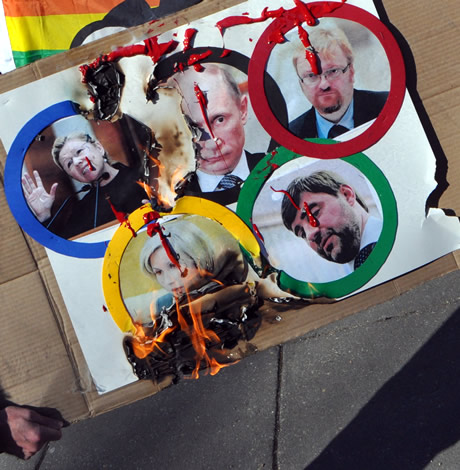
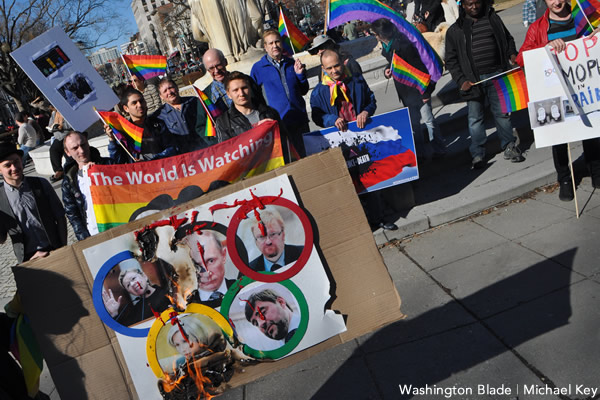
(Washington Blade photo by Michael Key)
Advocates remain largely skeptical of the International Olympic Committee’s efforts to strengthen its anti-discrimination provisions in the wake of the controversial 2014 Winter Olympics that took place in Russia against the backdrop of the country’s anti-LGBT rights record.
The IOC in December 2014 amended the Olympic Charter’s anti-discrimination clause known as Principle 6 to include sexual orientation. The organization, which is based in the Swiss city of Lausanne, a couple of months earlier added an anti-discrimination clause to its host city contract.
Human rights advocates sharply criticized the IOC’s decision late last month to award the 2022 Winter Olympics to Beijing. The Kazakh city of Almaty was a finalist to host the games, despite the fact that lawmakers in the former Soviet republic in February approved a bill that would ban the promotion of so-called gay propaganda.
Beijing won the games by a 44-40 vote margin.
“These policies are a bunch of fluff,” said Cyd Zeigler, Jr., co-founder of Outsports.com, an LGBT sports website, as he discussed the IOC’s expanded anti-discrimination provisions. “What matters is the cities they choose to be the hosts and the discriminatory countries that are allowed to participate. The Olympics just selected a country not just with huge LGBT issues, but human rights violations that are massive.”
“They almost picked a country that’s even worse,” he added.
A Russian-style bill that sought to ban the promotion of so-called propaganda to minors received final approval in the Kazakh Parliament shortly after IOC members visited the country in February. The Kazakhstan Constitutional Council in May struck down the measure, but a lawmaker has said he plans to reintroduce it.
A report that Human Rights Watch released a week before the IOC awarded the 2022 Winter Olympic games to Beijing notes the Kazakh propaganda bill “would have directly contravened” Principle 6 of the Olympic Charter.
“The IOC shouldn’t take its eye off the ball on ugly discrimination and human rights abuses for Olympic host contenders,” said Kyle Knight, a Human Rights Watch researcher who wrote the report, in a press release that announced it. “The IOC and the Kazakhstan government should publicly condemn anti-LGBT discrimination to signal that there is no place for homophobia in global sport or the countries that want to host Olympic games.”
Zhanar Sekerbayeva of the Kazakhstan Feminist Initiative earlier this month during a Skype interview from Amsterdam described the release of the Human Rights Watch report as a “very significant” moment.
Retired tennis player Martina Navratilova and other prominent sports figures in May expressed their opposition to Kazakhstan’s bid to host the 2022 Winter Olympics in a letter they wrote to IOC President Thomas Bach. Sekerbayeva noted Almaty-based advocates in an open letter to the IOC noted the former Soviet republic has what she described to the Blade as “a very bad homophobic situation.”
“We just tried to warn people in the committee that it may be a second Sochi,” Sekerbayeva told the Blade, referring to Kazakhstan’s bid to host the 2022 Winter Olympics. “Of course we didn’t want this.”
Chinese advocates with whom the Blade spoke were reluctant to discuss whether the Beijing games would have any impact on pro-LGBT efforts in their country.
“I have no idea about how the Winter Olympics will do anything to improve the overall human rights record,” said Xin “Iron” Ying, executive director of the Beijing LGBT Center. “We have never heard government officials talk about LGBT rights in China.”
“Maybe it will change in the next 10 years,” she added.
Another Chinese advocate said questions about whether the 2022 Winter Olympics would have a positive impact on the country’s LGBT rights movement “were too sensitive.”
Principle 6 to be applied in Beijing
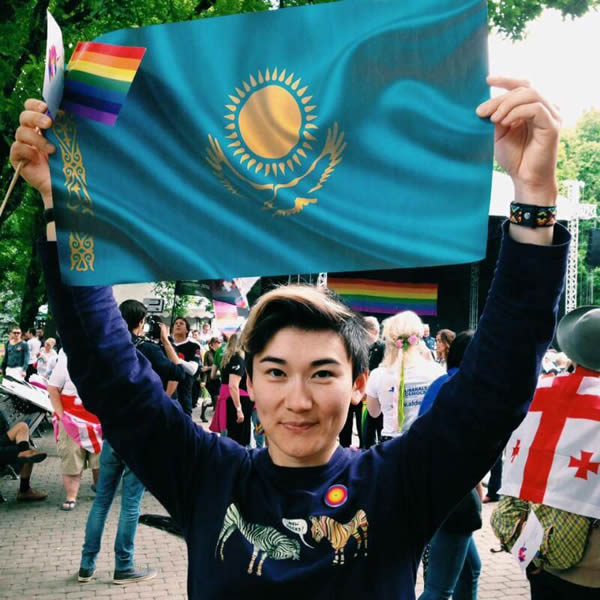
Zhanar Sekerbayeva of the Kazakhstan Feminist Initiative at EuroPride in Riga, Latvia, in June (Photo courtesy of Zhanar Sekerbayeva)
Russian President Vladimir Putin in June 2013 signed a broadly worded law that bans the promotion of so-called gay propaganda to minors.
LGBT rights advocates in the U.S. and elsewhere urged athletes to boycott the Sochi games over the controversial law, but Putin insisted that gays and lesbians attending the Olympics would not face discrimination. Bach said he had received repeated assurances from the Kremlin that LGBT athletes and spectators would be welcome in Russia.
Authorities in Moscow and St. Petersburg arrested more than a dozen people who protested the Kremlin’s LGBT rights record on the same day the games opened in Sochi. Russian police arrested Vladimir Luxuria, a transgender former Italian parliamentarian, twice in the Black Sea resort city after she publicly challenged the gay propaganda law during the Olympics.
Sekerbayeva noted to the Blade that the Kazakh government in its bid to host the 2022 Winter Olympics insisted that LGBT people did not face discrimination or harassment from the police in the former Soviet republic. She said people blamed LGBT rights advocates for the IOC’s decision to award the games to Beijing and not Almaty.
“We see how our society decided to blame us,” said Sekerbayeva.
Mark Adams, a spokesperson for the IOC, told the Blade in a statement that organizers of the 2022 Winter Olympics in Beijing have pledged that “for all games-related matters and for all participants, the Olympic Charter, including respect of Principle 6, will be fully applied.”
“The IOC is clear that sport is a human right and should be available to all regardless of race, sex or sexual orientation as stated in the Olympic Charter,” said Adams. “The games themselves should be open to all, free of discrimination, and that applies to spectators, officials, media and, of course, athletes. This has been upheld at all editions of the Olympic games.”
Maria von Känel, general manager of the Swiss Rainbow Families Association, told the Blade the decision to amend Principle 6 and add an anti-discrimination clause to the Olympics host city contracts shows that members of the IOC listened to LGBT rights advocates’ concerns in the wake of the Sochi games.
“It’s something powerful,” she said during a Skype interview from Zurich. “It’s visible, but I think it’s a start. Now we have to implement it.”
Sekerbayeva, like von Känel, welcomes the inclusion of sexual orientation in Principle 6. She nevertheless questioned why the IOC waited until after the Sochi games to amend the Olympic Charter’s anti-discrimination clause.
“I always wondered why we should wait for something very bad (to happen) and then we decide to have some decision,” said Sekerbayeva. “We did not want Sochi to go and have the Olympic games, but it did and we saw a lot of bad things, a lot of hate speech.”
“It’s better to (make these decisions) before such big events,” she added.
Zeigler made a similar point, noting Beijing hosted the 2008 Summer Olympics despite China’s human rights record.
“Forget about LGBT rights, they don’t care about human rights,” he told the Blade, referring to the IOC. “It’s irrelevant. They have a lengthy record to demonstrate that.”
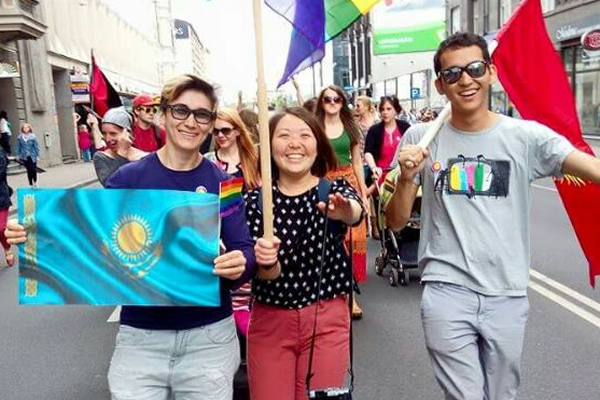
Zhanar Sekerbayeva of the Kazakhstan Feminist Initiative, left, and two LGBT rights advocates from Kyrgyzstan take part in EuroPride in Riga, Latvia, in June (Photo courtesy of Zhanar Sekerbayeva of the Kazakhstan Feminist Initiative)
Sports
Brittney Griner, wife expecting first child
WNBA star released from Russian gulag in December 2022
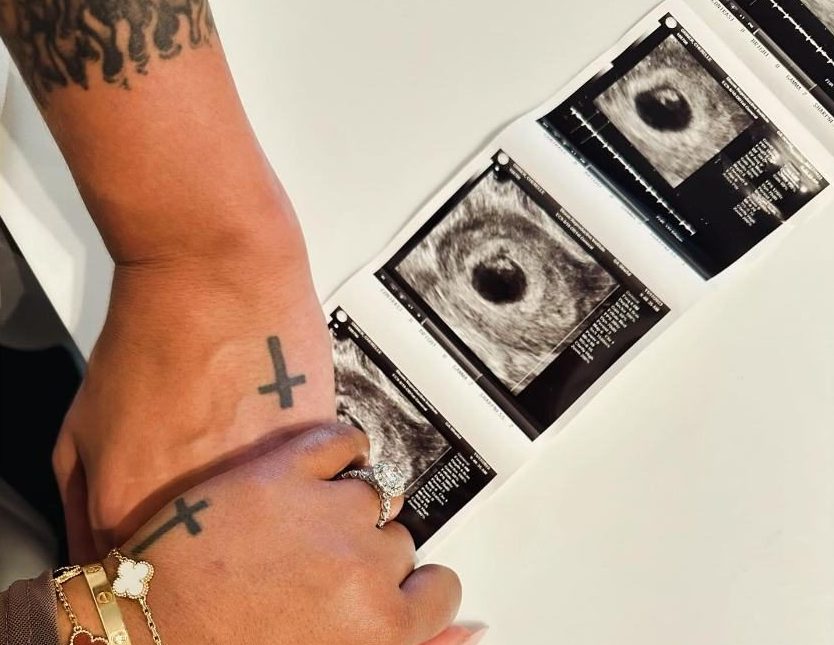
One year after returning to the WNBA after her release from a Russian gulag and declaring, “I’m never playing overseas again,” Phoenix Mercury star Brittney Griner and her wife announced they have something even bigger coming up this summer.
Cherelle, 31, and Brittney, 33, are expecting their first child in July. The couple shared the news with their 715,000 followers on Instagram.
“Can’t believe we’re less than three months away from meeting our favorite human being,” the caption read, with the hashtag, #BabyGrinerComingSoon and #July2024.
Griner returned to the U.S. in December 2022 in a prisoner swap, more than nine months after being arrested in Moscow for possession of vape cartridges containing prescription cannabis.
In April 2023, at her first news conference following her release, the two-time Olympic gold medalist made only one exception to her vow to never play overseas again: To return to the Summer Olympic Games, which will be played in Paris starting in July, the same month “Baby Griner” is due. “The only time I would want to would be to represent the USA,” she said last year.
Given that the unrestricted free agent is on the roster of both Team USA and her WNBA team, it’s not immediately clear where Griner will be when their first child arrives.
The Griners purchased their “forever home” in Phoenix just last year.
“Phoenix is home,” Griner said at the Mercury’s end-of-season media day, according to ESPN. “Me and my wife literally just got a place. This is it.”
As the Los Angeles Blade reported last December, Griner is working with Good Morning America anchor Robin Roberts — like Griner, a married lesbian — on an ESPN television documentary as well as a television series for ABC about her life story. Cherelle is executive producer of these projects.
Next month, Griner’s tell-all memoir of her Russian incarceration will be published by Penguin Random House. It’s titled “Coming Home” and the hardcover hits bookstores on May 7.
Sports
Applause and criticism for Staley’s trans-inclusive stance
South Carolina Gamecocks women’s coach made comments on Sunday
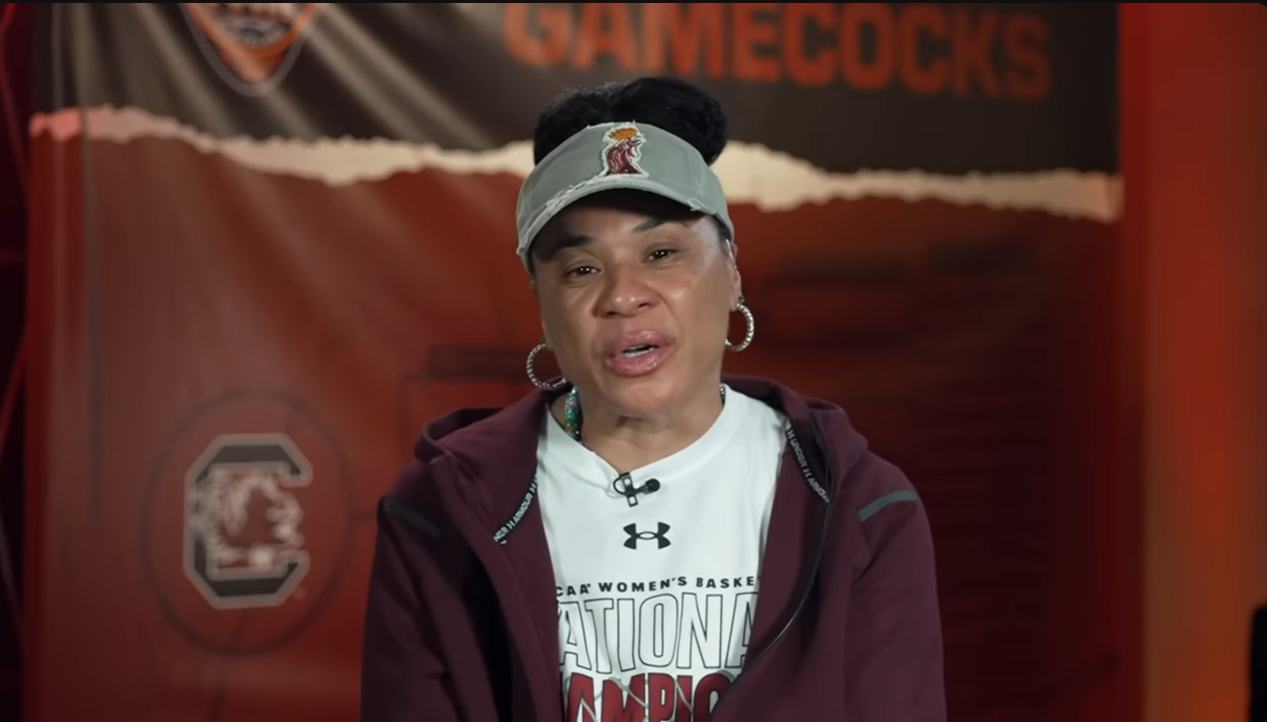
If not for a conservative transphobic blogger, this moment should be a celebration of NCAA women’s basketball coach Dawn Staley and the women of the South Carolina Gamecocks.
On Sunday, they concluded their undefeated season with a decisive win and a championship title. But when Staley faced reporters before that big game, Outkick’s Dan Zakheske asked her an irrelevant, clickbait question about transgender women in sports, referring to them as “biological males.”
Staley could have ignored the question, or stated she had no opinion, but instead the legendary coach offered a crystal clear endorsement of trans women competing in women’s sports, something outlawed in her home state of South Carolina for girls in kindergarten through college.
“I’m of the opinion,” said Staley, “If you’re a woman, you should play. If you consider yourself a woman and you want to play sports or vice versa, you should be able to play. That’s my opinion.”
Zakheske clearly wasn’t satisfied with that declaration of allyship and Staley swiftly cut him off.
“You want me to go deeper?” she asked.
“Do you think transgender women should be able to participate,” he started to say, when the coach stole the ball and took it downtown on a fastbreak. “That’s the question you want to ask? I’ll give you that. Yes. Yes. So, now the barnstormer people are going to flood my timeline and be a distraction to me on one of the biggest days of our game, and I’m okay with that. I really am.”
Staley is herself a Hall of Fame player a leading voice for diversity.
Reaction to her comments were swift, from LGBTQ rights organizations, athletes and inclusion opponents.
“Coach Staley simply spoke the truth that trans women are women and should play if they want,” said Sarah Kate Ellis, president and CEO of GLAAD, in a post on Instagram. “All of us can take a page from Coach Staley’s playbook as a sports leader and as a person of high integrity guided by faith, compassion and common sense.”
A White House pool reporter revealed President Joe Biden called Staley Sunday evening to congratulate her and the Gamecocks on their championship win. But it’s not clear if she and the president, an outspoken supporter of trans rights, discussed her remarks on trans athletes.
A number of Black leaders in the LGBTQ movement applauded Staley for taking a stand.
“Coach Staley has always been a trailblazer, but she’s also shown that true leadership is about advancing justice and equality for everyone,” said Human Rights Campaign President Kelley Robinson. “By expressing her full-throated support for transgender athletes’ inclusion in sports, she’s sending an important message — our shared humanity matters.
“Coach Staley showed courage and vulnerability, in choosing to answer the question and make a powerful statement of support for trans people on one of the biggest days and biggest stages in sports history,” said Kierra Johnson, executive director of the National LGBTQ Task Force, in a statement. “Not only does that make her a leader we can all aspire to like, it makes her a class act. She has etched her legacy in the history books with her play, her coaching, her heart and her smarts.”
In congratulating Staley on her championship title victory, Dr. David J. Johns, the CEO and executive director of the National Black Justice Coalition, also commended her for “her unwavering advocacy and support for transgender people in sports.”
“In a time when transgender athetes face unjust scrutiny, discrimination and exclusion from the National Association of Intercollegiate Athletics, her courage to speak truth to power and in support of inclusion and fairness sets a powerful example for us all, and is a testament to her integrity and compassion.”
The NBJC leader was referring to Monday’s announcement by the NAIA, the governing body of athletic programs at small colleges nationwide, voting 20-0 to essentially ban trans women from competing with other women beginning Aug. 1, as ESPN reported.
“It is a shocking and devastating development that the NAIA, an organization that has done so much to open doors, is now slamming those doors shut on transgender athletes,” said Sasha Buchert, Lambda Legal’s senior attorney and director of the organization’s nonbinary and trans rights project.
“Instead of standing up in support of transgender young people, the NAIA has simply turned its back on them — permanently depriving them of the benefits of competition. Would that they had the courage of victorious University of South Carolina women’s basketball coach Dawn Staley, who didn’t miss a beat in clarifying that transgender women should be able to play.”
However, praise for Staley’s stance was not universal.
Riley Gaines, failed former college swimmer and paid shill for the anti-inclusion organization, Independent Women’s Forum, called Staley “entirely incompetent or a sell-out” on Fox News. “Personally, I don’t think she believes what she said.”
Gaines has turned her fifth-place tie with out trans NCAA champion Lia Thomas into a career as a crusader against inclusion and a former advisor to the presidential campaign of Florida Gov. Ron DeSantis.
Val Whiting, a former Stanford University and professional women’s basketball player, tweeted her strong disagreement with Staley. “A lot of my basketball sisters feel differently but trans women do not belong in women’s sports. It’s not fair nor safe for biological women. There has to be another solution for trans women to be able to compete athletically besides having them compete against biological women.”
A lot of my basketball sisters feel differently but trans women do not belong in women’s sports. It’s not fair nor safe for biological women. There has to be another solution for trans women to be able to compete athletically besides having them compete against biological women.
— Val Whiting (@iamcoachval) April 7, 2024
Zaksheske’s Outkick colleague, anti-trans pundit David Hookstead, also went all-in with a transphobic post.
“Dawn Staley says she supports men who identify as women competing against real women in sports. Her view could literally destroy women’s basketball forever. Why won’t more people stand up for women?”
Dawn Staley says she supports men who identify as women competing against real women in sports.
— David Hookstead (@dhookstead) April 6, 2024
Her view could literally destroy women’s basketball forever.
Why won’t more people stand up for women? pic.twitter.com/2A59KTqvHb
Hookstead then boasted that Staley blocked his account.
Republican South Carolina Congresswoman Nancy Mace retweeted Zaksheske’s account of his interaction with Staley, calling her support of trans athletes “absolute lunacy.” That in turn won praise from Caitlyn Jenner, who retweeted Whiting and posted her thanks to Mace, along with this comment: “There is nothing complicated about this issue!”
What is complicated is that Jenner has never explained why she has competed with cisgender women in golf ever since her transition almost a decade ago.
You’re a hypocrite. pic.twitter.com/42DKwA9jmF
— Art Candee 🍿🥤 (@ArtCandee) April 7, 2024
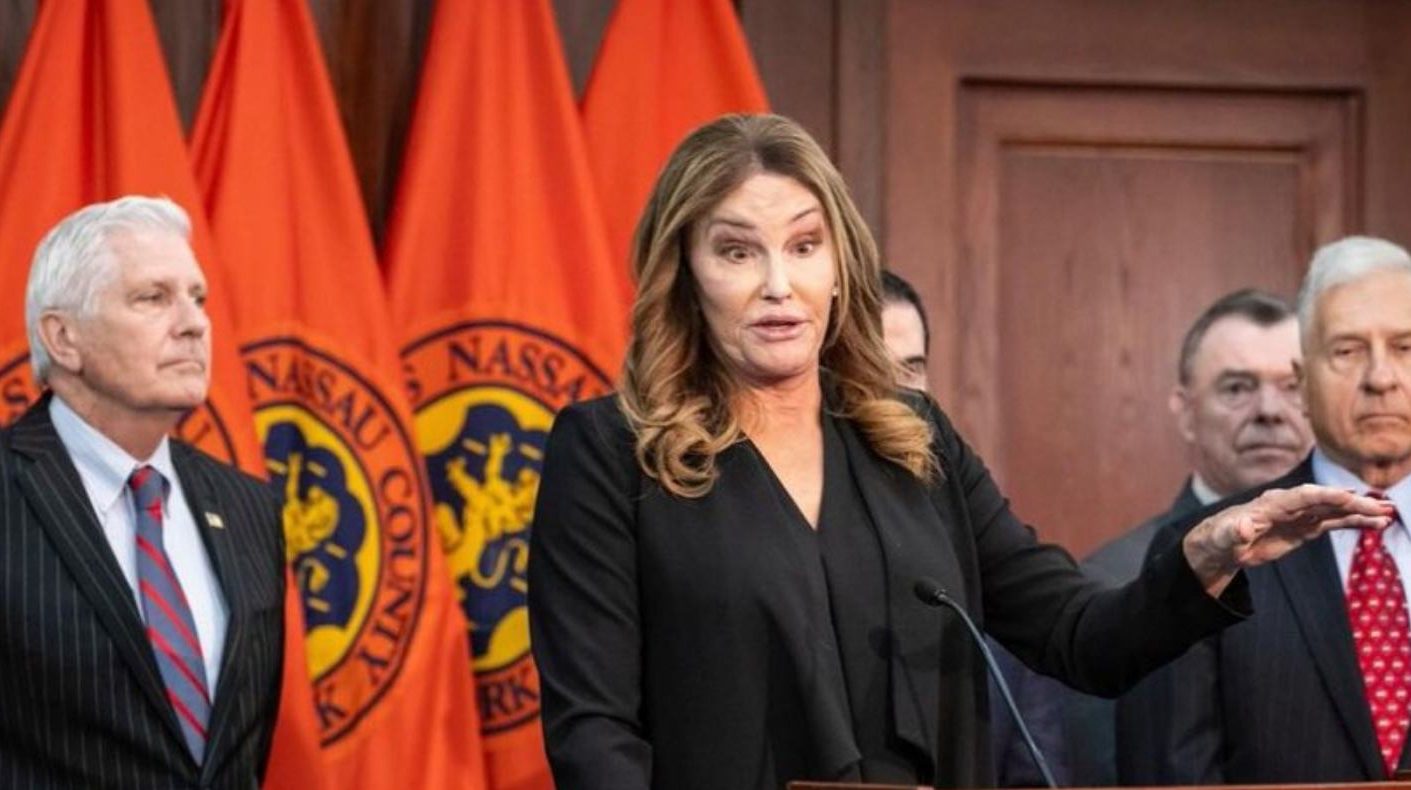
Caitlyn Jenner flew from Malibu to New York this week to join her fellow Republicans in their nationwide quest to keep transgender girls and women from competing in sports with other women.
“Let’s stop it now while we can,” said the Olympic gold medalist, at a news conference carried live by Fox News Channel.
Republican Nassau County Executive Bruce Blakeman organized the event so that Jenner could speak in support of his February executive order banning trans athletes at more than 100 county-owned facilities.
“Trans women are competing against women, taking valuable opportunities for the long-protected class under Title IX and causing physical harm,” said Jenner without providing supportive evidence of her claim. Jenner said the ban would defeat “the woke agenda.”
Her comments drew praise from former NCAA swimmer and paid shill Riley Gaines, who represents the Independent Women’s Forum and has also worked with the failed presidential campaign of Republican Gov. Ron DeSantis of Florida on his anti-trans athlete platform.
We stand with Executive Blakeman as he faces shameful retaliation from @TishJames for merely protecting sports on the basis of sex
— Riley Gaines (@Riley_Gaines_) March 18, 2024
Thanks to you both, @Caitlyn_Jenner @NassauExec !!👏🏼 https://t.co/vAsWfayI7l
“If the left wants to fight this battle on this hill, it’s a losing battle,” said Jenner. “We will win the battle.” She claimed she spoke on behalf of women and girls, contradicting her past statements in support of trans girls competing according to their gender identity and despite the fact she herself still competes in women’s sports.
Shortly after the ban was announced last month, New York State Attorney General Letitia James and New York Gov. Kathy Hochul, both Democrats, denounced it and accused Blakeman of “bullying trans kids.”
James called the order “transphobic and deeply dangerous,” and argued that it violates the state’s anti-discrimination laws. The state attorney general challenged it in court March 1 with a “cease and desist letter,” demanding that Blakeman rescind the order, saying it subjects women’s and girls’ sports teams to “invasive questioning.”
As the Los Angeles Blade reported, Blakeman’s legal team countered with its own lawsuit on March 5, claiming her cease and desist letter violates the 14th Amendment’s equal protection clause.
“Not only was the executive order legal, but we had an obligation to defend it,” Blakeman said Monday.
The order has also been challenged by the New York Civil Liberties Union, which filed suit last week on behalf of a women’s roller derby league based in Nassau County that welcomes trans women and would be barred from using the county’s facilities by Blakeman’s executive order.
Just days before the Long Island news conference, Jenner joined Olympian Sharron Davies, who also campaigns against trans inclusion in sports, for an conversation with a British newspaper, the Telegraph, which has been outspoken against trans inclusion.
They recalled that in their day, tests to determine sex were mandatory in order to compete, and Jenner said she has been “pushing” for sex tests to return to sports, decades after sports organizations around the world abandoned the practice because they were unreliable. “If they continue down this road, it will be pretty much the end of women’s sport as we know it.”
“I can still hit a golf ball 280 yards,” Jenner continued, not mentioning she plays from the ladies’ tee. She did however opine about not being “a real woman,” acknowledging that many trans women disagree with her view.
“They keep saying, ‘Oh, I’m a real woman, I’m a real woman,’ and I’m going, ‘No, you’re not,’” said Jenner. “I will use your preferred pronouns, I will treat you as a female, you can run and dress and do whatever you want, I have nothing against that, it’s fine, but biologically you’re still male.”
She added: “Let me explain — I am biologically male, OK? I’m XY. There’s nothing I can do to change that. If you believe in gender dysphoria, and I think most people do realize it’s not a disease, it’s a mental condition, just like some people are left-handed and some people are right-handed, it’s kind of the way you’re born and I’ve dealt with it my entire life.“
“I consider myself a trans person, I am still genetically male, I changed all of my ID right down to my birth certificate so technically yes, I am female, but on the other hand I know I’m not.”

















